Canon HF R100, HF R11, HF R10 User Manual
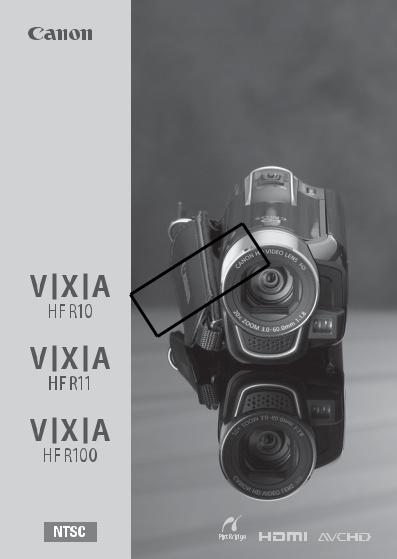
PUB. DIE-0342-000
HD Camcorder
Instruction Manual
Y
P
O
C
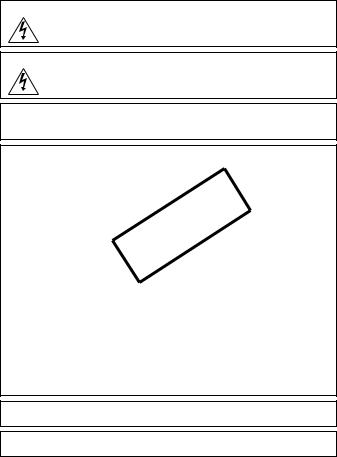
Important Usage Instructions
WARNING!
TO REDUCE THE RISK OF FIRE OR ELECTRIC SHOCK, DO NOT EXPOSE THIS PRODUCT TO RAIN OR MOISTURE.
WARNING!
TO REDUCE THE RISK OF ELECTRIC SHOCK AND TO REDUCE ANNOYING INTERFERENCE, USE THE RECOMMENDED ACCESSORIES ONLY.
COPYRIGHT WARNING:
Unauthorized recording of copyrighted materials may infringe on the rights of copyright owners and be contrary to copyright laws.
HD Camcorder, VIXIA HF R11 A / VIXIA HF R10 A / VIXIA HF R100 A systems
This device complies with Part 15 of the FCC Rules. Operation is subject to the following two conditions:
(1) This device may not cause harmful interference, and (2) this device must accept any interference received, including interference that may cause undesired operation.
Note: This equipment has been tested and found to comply Ywith the limits for class B digital device, pursuant to Part 15 of the FCC Rules. These limits arePdesigned to provide reasonable protection against harmful interference in a residential installation. This equipment generates, uses and can radiate radio frequency energy and, if not installedOand use in accordance with the instructions, may cause harmful interference to radioCcommunications. However, there is no guarantee that interference will not occur in a particular installation. If this equipment does cause harmful interference to radio or television reception, which can be determined by turning the equipment off and on, the user is encouraged to try to correct the interference by one or more of the following measures:
•Reorient or relocate the receiving antenna.
•Increase the separation between the equipment and receiver.
•Connect the equipment into an outlet on a circuit different from that to which the receiver is connected.
•Consult the dealer or an experienced radio/TV technician for help.
Use of shielded cable is required to comply with class B limits in Subpart B of Part 15 of FCC Rules. Do not make any changes or modifications to the equipment unless otherwise specified in the manual. If such changes or modifications should be made, you could be required to stop operation of the equipment.
Canon U.S.A., Inc.
One Canon Plaza, Lake Success, NY 11042, U.S.A.
Tel No. (516)328-5600
CAUTION:
TO PREVENT ELECTRIC SHOCK, MATCH WIDE BLADE OF PLUG TO WIDE SLOT, FULLY INSERT.
WARNING:
To reduce the risk of electric shock, do not expose this product to dripping or splashing.
2
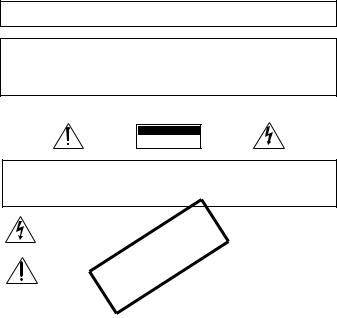
The Mains plug is used as the disconnect device. The Mains plug shall remain readily operable to disconnect the plug in case of an accident.
CAUTION:
•Danger of explosion if the wrong type of batteries are attached. Use only the same type of batteries.
•Do not expose batteries or product to excessive heat such as the inside of a car under direct sunlight, fire, etc.
Important Warning
CAUTION
RISK OF ELECTRIC SHOCK
DO NOT OPEN
CAUTION:
TO REDUCE THE RISK OF ELECTRIC SHOCK, DO NOT REMOVE COVER (OR BACK). NO USER-SERVICEABLE PARTS INSIDE. REFER SERVICING TO QUALIFIED SERVICE PERSONNEL.
The lightning flash with arrowhead symbol, within an equilateral triangle, is intended to alert the
|
Y |
user to the presence of uninsulated “dangerous voltage” within the product’s enclosure, that may |
|
be of sufficient magnitude to constitute a risk of electric shock to persons. |
|
|
P |
|
O |
The exclamation point, within an equilateral triangle, is intended to alert the user to the presence |
|
of important operating and maintenance (servicing) instructions in the literature accompanying |
|
the product. |
C |
|
|
3
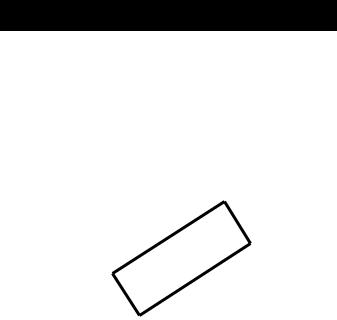
IMPORTANT SAFETY INSTRUCTIONS
In these safety instructions the word “apparatus” or “product” refers to the Canon HD Camcorder VIXIA HF R11 A / VIXIA HF R10 A / VIXIA HF R100 A and all its accessories.
1Read these instructions.
2Keep these instructions.
3Heed all warnings.
4Follow all instructions.
5Do not use this apparatus near water.
6Clean only with dry cloth.
7Do not install near any heat sources such as radiators, heat registers, stoves, or other apparatus (including amplifiers) that produce heat.
8Protect the power cord from being walked on or pinched particularly at plugs, convenience receptacles, and the point where they exit from the apparatus.
9Unplug this apparatus during lightning storms or when unused for long periods of time.
10Read instructions — All the safety and operating instructions should be read before the product is operated. Y
11Retain instructions — The safety and operatingPinstructions should be retained for future reference.
12Heed Warnings — All warnings on theOproduct and in the operating instructions should be adhered to.
13Follow instructions — All operatingCand maintenance instructions should be followed.
14Cleaning — Unplug this product from the wall outlet before cleaning. Do not use liquid or aerosol cleaners. The product should be cleaned only as recommended in this manual.
15Avoid magnetic or electric fields — Do not use the camera close to TV transmitters, portable communication devices or other sources of electric or magnetic radiation. They may cause picture interference, or permanently damage the camera.
16Water and Moisture — Hazard of electric shock — Do not use this product near water or in rainy/moist situations.
17Placing or Moving — Do not place on an unstable cart, stand, tripod, bracket or table. The product may fall, causing serious injury to a child or adult, and serious damage to the product. A product and cart combination should be moved with care. Quick stops, excessive force, and uneven surfaces may cause the product and cart combination to overturn.
18Power Sources — The product should be operated only from the type of power source indicated on the marking label. If you are not sure of the type of power supply to your home, consult your product dealer or local power company. Regarding other power sources such as battery power, refer to instructions in this manual.
19Overloading — Do not overload wall outlets and extension cords as this can result in a risk of fire or electric shock.
4
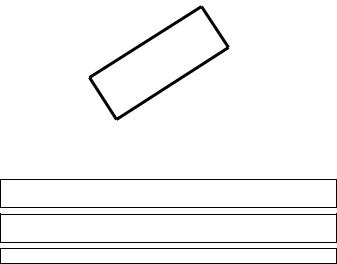
20Objects and Liquid Entry — Never push objects of any kind into this product through openings as they may touch dangerous voltage points or short out parts that could result in a fire or electric shock. Be careful not to spill liquid of any kind onto the product.
21Servicing — Do not attempt to service this product yourself as opening or removing covers may expose you to dangerous voltage or other hazards. Refer all servicing to qualified service personnel.
22Power Sources — The CA-590 Compact Power Adapter should be operated only from the type of power source indicated on the marking label. If you are not sure of the type of power supply to your home, consult your product dealer or local power company. Regarding other power sources such as battery power, refer to instructions in this manual.
23Lightning — For added protection of this product during a lightning storm, or when it is left unattended and unused for long periods of time, disconnect it from the wall outlet and disconnect the antenna. This will prevent damage to the product due to lightning and powerline surges.
24Overloading — Do not overload wall outlets and extension cords as this can result in a risk of fire or electric shock.
25Damage Requiring Service — Disconnect this product from the wall outlet and all power sources including battery, and refer servicing to qualified service personnel under the following conditions:
a.When the plug is damaged.
b.If any liquid has been spilled onto, or objects have fallen into, the product.
c.If the product has been exposed to rain or water.
d.If the product does not operate normallyYeven if you follow the operating instructions. Adjust only those controls that arePcovered by the operation instructions. Improper adjustment of other controls may result in damage and will often require extensive work by a qualified technician toOrestore the product to its normal operation.
e.If the product has been dropped or the cabinet has been damaged.
f.When the productCexhibits a distinct change in performance. This indicates a need for service.
26Replacement Parts — When replacement parts are required, be sure the service technician has used replacement parts that are specified by Canon or that have the same characteristics as the original part. Unauthorized substitutions may result in fire, electric shock or other hazards.
27Safety Check — Upon completion of any service or repairs to this product, ask the service technician to perform safety checks to determine that the product is in safe operating order.
This product is not intended to be serviced. Should the product cease to function in its intended manner, it should be returned to the manufacturer or be discarded.
When replacement of the power supply is required, please return it to the responsible nearest Canon Service Center and please replace it with the same type number CA-590.
This Class B digital apparatus complies with Canadian ICES-003.
5
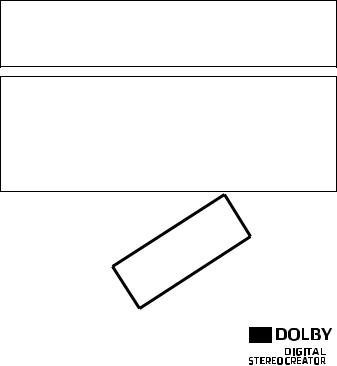
The adapter can be used with a power supply between 100 and 240 V AC. For areas where 120 V AC power is not used, you will need a special plug adapter. Contact your nearest Canon Service Center for further information.
The adapter is not intended to be serviced. Should the product cease to function in its intended manner, it should be returned to the manufacturer or be discarded.
The serial number of this product can be found on the battery compartment cover of the camcorder. Write down the number and other information here and retain this book as a permanent record of your purchase to aid identification in case of theft.
Model Name: VIXIA HF R11 A / VIXIA HF R10 A / VIXIA HF R100 A Date of Purchase: Serial No.:
Purchased From:
Dealer Address: Dealer Phone No.:
Y
OP
•Microsoft and Windows are trademarksCor registered trademarks of Microsoft Corporation in the United States and/or other countries.
•Macintosh and Mac OS are trademarks of Apple Inc., registered in the U.S. and other countries.
•“x.v.Color” and the “x.v.Color” logo are trademarks.
•HDMI, the HDMI logo and High-Definition Multimedia Interface are trademarks or registered trademarks of HDMI Licensing LLC.
•“AVCHD” and the “AVCHD” logo are trademarks of Panasonic Corporation and Sony Corporation.
•Manufactured under license from Dolby Laboratories.
“Dolby” and the double-D symbol are trademarks of Dolby Laboratories.
•YouTube is a trademark of Google Inc.
•Other names and products not mentioned above may be trademarks or registered trademarks of their respective companies.
•This device incorporates exFAT technology licensed from Microsoft.
•ANY USE OF THIS PRODUCT OTHER THAN CONSUMER PERSONAL USE IN ANY MANNER THAT COMPLIES WITH THE MPEG-2 STANDARD FOR ENCODING VIDEO INFORMATION FOR PACKAGED MEDIA IS EXPRESSLY PROHIBITED WITHOUT A LICENSE UNDER APPLICABLE PATENTS IN THE MPEG-2 PATENT PORTFOLIO, WHICH LICENSE IS AVAILABLE FROM MPEG LA, L.L.C., 250 STEELE STREET, SUITE 300, DENVER, COLORADO 80206.
•This product is licensed under AT&T patents for the MPEG-4 standard and may be used for encoding MPEG-4 compliant video and/or decoding MPEG-4 compliant video that was encoded only (1) for a personal and noncommercial purpose or (2) by a video provider licensed under the AT&T patents to provide MPEG-4 compliant video. No license is granted or implied for any other use for MPEG-4 standard.
6
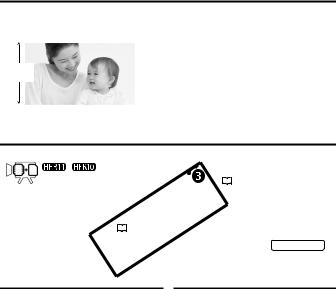
Exciting Features and New Functions

 High-Definition Video
High-Definition Video
Your camcorder’s high-definition image sensor (HD CMOS) captures video at a resolution of 1,920 x 1,080 pixels2. Videos
are then recorded in the memory in high definition, using AVCHD specifications3. With your new HD camcorder, capturing the special moments in your life with
amazing image quality and in lifelike vibrant colors is easy and fun!
/ |
Dual Flash |
Pre-recording |
|||
Memory |
|
|
( |
|
59) |
|
|
|
|||
You can record in the built-in |
When pre-recording is activated, |
||||
memory or on commercially |
Ythe camcorder starts recording |
||||
available memory cards ( |
|
video continuously into a |
|||
37).P |
|||||
|
|
|
temporary 3-second memory. |
||
|
OWhen you press the START/STOP |
||||
|
|
|
button, the scene recorded will |
||
|
C have started 3 seconds before you |
||||
started shooting.
1“Full HD 1080” refers to Canon camcorders compliant with high-definition video composed of 1,080 vertical pixels (scanning lines).
2Video is recorded at this resolution only when the recording mode is set to FXP mode. In other recording modes, the picture is recorded at 1,440 x 1,080 pixels.
3AVCHD is a standard for recording high-definition video. With AVCHD specifications, the video signal is recorded using MPEG-4 AVC/H.264 compression and the audio signal is recorded in Dolby Digital.
7
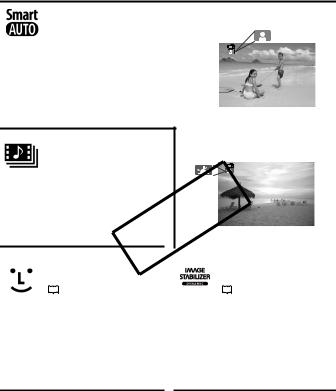
Smart AUTO
( 27)
27)
Smart AUTO automatically selects the best settings for the scene you want to shoot. You get spectacular recordings every time without worrying about settings.
Video Snapshot
( 58)
58)
Just point the camcorder and it will automatically select the best settings for your subject
Shoot or capture short scenes |
|
|
|
|
|
||
and arrange them into a video |
|
P |
|||||
clip set to your favorite |
|
||||||
|
|
Y |
|||||
background music. |
O |
||||||
|
|
|
|
|
|||
|
|
C |
|
|
|
|
|
|
|
|
Image Stabilization |
||||
Face Detection |
|
|
|||||
( |
|
62) |
|
( |
|
133) |
|
|
|
|
|||||
The camcorder automatically detects people’s faces and adjusts the focus and other settings accordingly for beautiful results.
Dynamic IS compensates for camcorder shake when you shoot video while walking. This gives you more freedom and mobility when recording movies.
8
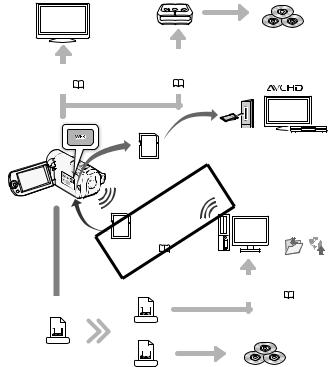
Enjoying your Recordings on Other Devices
|
|
|
|
|
|
AVCHD discs |
|
|
|
|
Connect the camcorder to |
Photo DVDs |
|||
|
|
|
|
|
|||
Connect the camcorder |
|
the optional DW-100 DVD |
|
|
|||
to an HDTV ( |
110) |
|
Burner ( |
113, 116) |
|
|
|
|
|
|
SD |
|
AVCHD-compatible HDTVs and |
||
|
|
|
|
|
|
digital recorders with an SD |
|
|
|
Play video directly |
|
memory card slot* |
|||
|
|
from your recorded |
|
|
|
||
|
|
|
Y |
|
|
||
|
|
|
memory card |
|
|
|
|
|
|
|
P |
|
Save or upload |
||
|
|
|
|
|
|
||
|
|
Eye-Fi |
|
|
|
|
to the Web |
|
C |
|
|
|
|||
|
|
|
|
|
|||
|
Use an Eye-OFi card ( 128) to |
|
|
|
|||
|
wirelessly upload recordings to your |
|
|
|
|||
|
computer or a video sharing Web site |
Use the supplied software |
|||||
|
|
|
|
|
|||
High Definition |
|
|
ImageMixer 3 SE ( |
111, 124) |
|||
|
|
|
|
|
|
||
|
|
|
MPEG-2 |
|
|
|
|
|
|
Standard Definition |
|
|
|
|
|
AVCHD |
|
|
|
|
|
|
|
|
|
|
SD-Video |
|
|
|
|
Convert your HD movies, in the |
|
|
Standard DVDs |
||||
camcorder itself, to standard definition files (  117, 125)
117, 125)
*Refer to the instruction manual of the device. Depending on the device used, correct playback may not be possible even if the device is AVCHD-compatible. In such case, play back the recordings on the memory card using the camcorder.
9

Table of contents
Introduction
7 Exciting Features and New Functions
14 About this Manual
16Getting to Know the Camcorder
16Supplied Accessories and CD-ROMs
18Names of Parts
Preparations
21Getting Started
21 |
Charging the Battery Pack |
||
24 |
Preparing the Accessories |
||
25 |
|
|
P |
Adjusting the Position and BrightnessYof the LCD |
|||
|
Screen |
O |
|
|
|
C |
|
27 Basic Operation of the Camcorder |
|||
27 |
Operating Modes |
|
|
30 |
Joystick and Joystick Guide |
||
31 |
Using the Menus |
|
|
33 First Time Settings
33Setting the Date and Time
34Changing the Language
34Changing the Time Zone
35Using a Memory Card
35Memory Cards Compatible for Use with the Camcorder
36Inserting and Removing a Memory Card
37 /
/ Selecting the Memory for the Recordings
Selecting the Memory for the Recordings
38 Initializing the Built-in Memory ( /
/ only) or Memory Card
only) or Memory Card
10 Table of contents
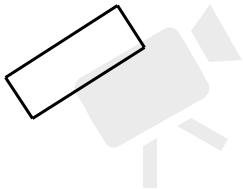
Video
40Basic Recording
40Shooting Video
41Selecting the Video Quality (Recording Mode)
42Zooming
43Quick Start Function
45 Basic Playback
45 Playing Back the Video
47 Selecting what Recordings to Play Back
49 Searching for Scenes
52Pre-selecting Recordings from the Index Screen
53Deleting Scenes
55 Advanced Functions
55 Programmed AE and Special Scene Recording
Programs
57Cinema Mode: Giving a Cinematic Look to Your Recordings
58Video Snapshot Y
59Pre-recording FunctionP Self Timer O Manual Exposure Adjustment ManualCFocus Adjustment Face Detection
White Balance5960616263
65 Image Effects
65 Digital Effects
67On-Screen Displays and Data Code
68Audio Recording Level
69Using Headphones
70Using an External Microphone
71Selecting the Playback Starting Point
74 Scene and Playlist Operations
74 Playing Back Recordings Set to Background Music
78Dividing Scenes
79Editing the Playlist: Adding, Deleting, Moving and Playing Back
82Capturing Video Snapshot Scenes from a Movie
83 /
/ Copying Scenes to a Memory Card
Copying Scenes to a Memory Card
Table of contents 11

Photos
86Basic Recording
86Taking Photos
87Selecting Photo Size and Quality
89Basic Playback
89Viewing Photos
90Deleting Photos
92Magnifying Photos during Playback
93Additional Functions
93Slideshow
94Rotating Photos
95Histogram Display
95Capturing Photos from a Movie
96Protecting Photos
97 /
/ Copying Photos to a Memory Card
Copying Photos to a Memory Card
100 |
Printing Photos |
|
|
100 |
Printing Photos (Direct Print) |
|
|
103 |
Print Orders |
P |
Y |
|
|
||
|
|
|
|
|
O |
|
|
External Connections |
|
|
|
106 |
C |
|
|
Terminals on the amcorder |
|
||
107 |
Connection Diagrams |
|
|
110Playback on a TV Screen
111Saving and Sharing Your Recordings
111Saving Recordings on a Computer
113 Saving Movies onto High-Definition Discs (AVCHD/Blu-ray Discs)
116  /
/ Saving Movies onto Standard-Definition Discs (DVD)
Saving Movies onto Standard-Definition Discs (DVD)
121Creating Photo DVDs
122Playing Back Discs Using the DW-100 DVD Burner
123Copying Your Recordings to an External Video Recorder
124Uploading Movies to Video Sharing Web Sites
12 Table of contents

Additional Information
130 Appendix: Menu Options Lists
130 FUNC. Menu
132 Setup Menus
143 Onscreen Icons and Displays
147 |
Trouble? |
147 |
Troubleshooting |
153 |
List of Messages |
163 |
Do’s and Don’ts |
163 |
Handling Precautions |
167Maintenance/Others
168Using the Camcorder Abroad
169General Information
169
170
173
174
178
Accessories |
|
|
Optional Accessories |
|
|
Product Codes |
|
Y |
Specifications |
|
|
|
|
|
Index |
P |
|
|
||
O |
|
|
C |
|
|
Table of contents 13
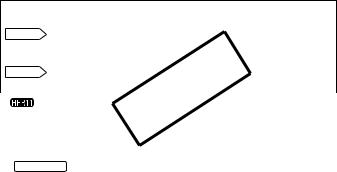
About this Manual
Thank you for purchasing the Canon VIXIA HF R11 / VIXIA HF R10 / VIXIA HF R100. Please read this manual carefully before you use the camcorder and retain it for future reference. Should your camcorder fail to operate correctly, refer to Troubleshooting (  147).
147).
Conventions Used in this Manual
• IMPORTANT: Precautions related to the camcorder’s operation.
IMPORTANT: Precautions related to the camcorder’s operation.
• NOTES: Additional topics that complement the basic operating procedures.
NOTES: Additional topics that complement the basic operating procedures.
• POINTS TO CHECK: Restrictions or requirements regarding the function described.
POINTS TO CHECK: Restrictions or requirements regarding the function described.
• : Reference page number within this manual.
: Reference page number within this manual.
To complete some operations you will need to refer also to other instruction manuals. This will be indicated with the following icons:
|
PHOTO Refer to the ‘Photo Application’ instruction manual, |
||
|
|
included as a PDF file in the supplied Camcorder |
|
|
|
Supplemental Disc. |
|
|
DW-100 |
Refer to the instruction manual of the optional DW-100 |
|
|
|
DVD Burner. |
Y |
|
|
P |
|
|
|
|
|
• |
: Text that applies only to the model(s) shown in the icon. |
||
• The following terms are usedOin this manual: |
|||
|
When not specified as “memory card” or “built-in memory”, the term |
||
|
|
C |
|
|
“memory” by itself refers to both. |
|
|
“Scene” refers to one movie unit from the point you press the START/STOP button to start recording until you press again to pause the recording.
•The photos included in this manual are simulated pictures taken with a still camera. Unless indicated otherwise, illustrations and menu
icons refer to the  .
.
14 Introduction
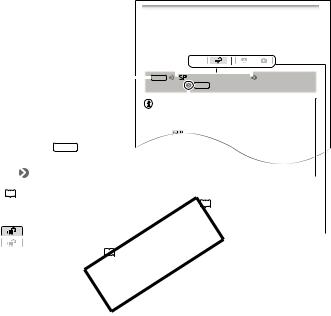
Selecting the Video Quality (Recording Mode)
The camcorder offers 4 recording modes. Changing the recording mode will change the recording time available on the memory. Select FXP or XP+ mode for better movie quality; select LP mode for longer recording times. The following table gives approximate recording times.
Operating modes: 

Brackets [ ] are used to refer to 
menu options as they are |
|
|
|
|
|
|
FUNC. |
|
[ |
|
|
Standard Play 7 Mbps] |
|
Desired recording |
|
|
|
||||||||||
|
|
|
|
|
|
|
|
|
|
|
|
|
|||||||||||||||
displayed on screen. |
|
|
|
|
|
|
mode |
|
|
FUNC. |
|
|
|
|
|
|
|
|
|
||||||||
|
|
|
|
|
|
|
|
|
|
|
NOTES |
|
|
|
|
|
|
|
|
|
|
|
|
|
|
||
|
|
|
|
|
|
|
|
|
|
|
|
|
|
|
|
|
|
|
|
|
|
|
|
|
|
||
The names of most buttons and |
|
|
• The camcorder uses a variable bit rate (VBR) to encode videoso the |
|
|||||||||||||||||||||||
|
|
actual recording times will vary depending on the content of the scenes. |
|||||||||||||||||||||||||
|
|
||||||||||||||||||||||||||
switches are indicated within a |
• The camcorder retains the last setting used even if you set the cam- |
||||||||||||||||||||||||||
“button” frame. |
|
|
|
|
|
corder to |
mode. |
|
|
|
|
|
|
|
|
|
|||||||||||
|
|
|
|
|
|
|
|
|
|
|
|
|
|
|
|
|
|
|
|
|
|
|
|||||
For example FUNC. . |
|
|
|
|
|
|
|
|
|
|
|
|
|
|
|
|
|
|
|
|
|
|
|
||||
|
|
|
|
|
|
|
|
|
|
|
|||||||||||||||||
The |
|
arrow is used to abbreviate menu selections. For a detailed |
|
|
|
||||||||||||||||||||||
explanation on how to use the menus, refer to Using the Menus |
|
||||||||||||||||||||||||||
( |
|
|
31). For a concise summary of all available menu options and |
|
|
|
|
|
|
||||||||||||||||||
|
|
|
|
|
|
|
|
||||||||||||||||||||
settings, refer to the appendix Menu Options Lists ( |
|
|
130). |
|
|
|
|
|
|
|
|
||||||||||||||||
|
|
|
|
|
|
|
|
|
|
||||||||||||||||||
|
|
|
|
|
|
|
|
|
|
|
|
|
|
|
|
|
|
|
|
|
|
|
|
|
|
|
|
|
|
|
|
|
|
|
|
|
|
|
Y |
||||||||||||||||
|
|
|
|
|
|
|
|
|
|
|
|||||||||||||||||
|
|
|
|
indicates that a function is available in the operating mode indicated and |
|
|
|
|
|||||||||||||||||||
|
|
|
|
||||||||||||||||||||||||
|
|
|
|
|
|
|
|
|
|
P |
|
|
|
|
|
|
|
|
|
||||||||
|
|
|
|
|
|
|
|
|
|
|
|
|
|
|
|
|
|
|
|||||||||
|
|
|
|
indicates that the function is not available. For a detailed explanation |
|
||||||||||||||||||||||
|
|
|
|
|
|
|
27). |
|
|
|
|
|
|
|
|
|
|
|
|
|
|
|
|
|
|
||
refer to Operating Modes ( |
|
|
|
|
|
|
|
|
|
|
|
|
|
|
|
|
|
|
|||||||||
|
|
|
|
|
|
|
|
|
|
|
|
|
|
|
|
|
|
|
|
||||||||
|
|
|
|
|
|
|
O |
|
|
|
|
|
|
|
|
|
|
|
|
|
|
||||||
|
|
|
|
C |
|
|
|
|
|
|
|
|
|
|
|
|
|
|
|
|
|
|
|||||
Introduction 15
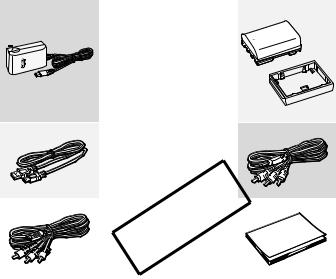
Supplied Accessories and CD-ROMs
The following accessories are supplied with the camcorder:
XCA-590 Compact Power
Adapter*
BP-2L5 Battery PackW
XIFC-300PCU USB Cable
STV-250N Stereo Video CableW
Yellow • Red • White plugs
|
|
P |
|
|
|
|
|
|
XCTC-100/S Component CableY |
|
|
|
O |
|
|
|
Red • Green • Blue plugs |
|
|
|
C |
Quick GuideW |
|
|
|
|
|
|
|
|
|
* CA-590E including power cord, in Asia.
16 Introduction
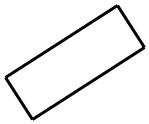
The following CD-ROMs and software are supplied with the camcorder:
•PIXELA Application - Disc 1 CD-ROM* and ‘PIXELA Applications’ Installation Guide
-ImageMixer 3 SE Transfer Utilities - Software for saving and transferring movies and music files you can use as background music.
•PIXELA Application - Disc 2 CD-ROM*
-ImageMixer 3 SE Video Tools - Software for managing, editing, and playing back movies.
• Instruction Manual/Photo Applications Ver.34.0*/Music Data
Instruction Manual/Photo Applications Ver.34.0*/Music Data
CD-ROM (referred to in this manual as “Camcorder Supplemental Disc”)
-Instruction Manual - The full-version instruction manual of the camcorder (this PDF file).
-Photo Application - Software for saving, managing, and printing photos.
-Music data - Music files that can be used as background music during playback. These music files are for exclusive use with the supplied software ImageMixer 3 SE. The disc cannot be played back on CD players. For more details, refer to ‘ImageMixer 3 SE Software Guide’.
* The CD-ROM includes the instruction manualYof the software (on PDF file). P O C
Introduction 17
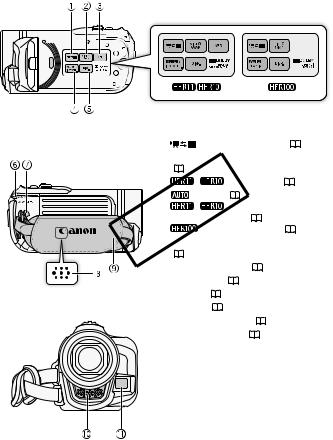
Names of Parts
Left side view
Right side view |
1 |
|
(camera/play) button ( |
29) |
||||
|
2 VIDEO SNAP (video snapshot) button |
|||||||
|
|
( |
58) |
|
|
|
|
|
|
3 |
|
Y |
|
|
124) |
||
|
|
/ |
|
WEB button ( |
||||
|
|
P |
|
27)/ |
|
|
||
|
4 |
|
button ( |
|
|
|||
|
|
|
/ |
|
INDEX SEL. (index |
|||
|
O |
|
|
|
47)/ |
|
||
|
C |
selection) button ( |
|
|||||
|
|
|
PLAYLIST button ( |
47) |
||||
|
|
|
|
|||||
|
5 DISP. (on-screen display) button |
|||||||
|
|
( |
67) |
|
|
|
|
|
|
6 ACCESS indicator ( |
40, 86) |
|
|||||
|
7 Strap mount ( |
24) |
|
|
||||
|
8 Speaker ( |
45) |
|
|
|
|||
Front view |
9 Grip belt ( |
24) |
|
|
|
|||
qA Stereo microphone ( |
68) |
|
||||||
|
|
|||||||
|
aA Instant AF sensor ( |
133) |
|
|||||
18 Introduction
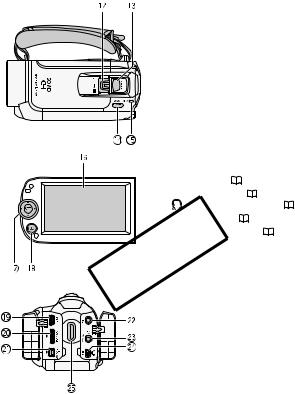
Top view
LCD panel
Back view
As Zoom lever ( 42)
42)
Ad PHOTO button ( 86) Af POWER button
86) Af POWER button
gA ON/OFF (CHG) (charge) indicator: Green – On
Orange – Standby ( 43) Red – Charging (
43) Red – Charging (  21)
21)
hA LCD screen ( 25) jA Joystick (
25) jA Joystick (  30)
30)
Ak FUNC. button (  31, 130) Al USB terminal (
31, 130) Al USB terminal ( 106, 109)
106, 109)
qS HDMI OUT terminal ( 106, 107) aS COMPONENT OUT terminal
106, 107) aS COMPONENT OUT terminal
( 106, 108)
106, 108)
sS MIC terminal ( |
70) |
dS AV OUT terminal ( |
106, 108)/ |
(headphones) terminal ( 69) |
|
fS DC IN terminal ( |
21) |
Y |
|
gS START/STOP button ( 40) |
|
P |
|
O |
|
C |
|
Introduction 19
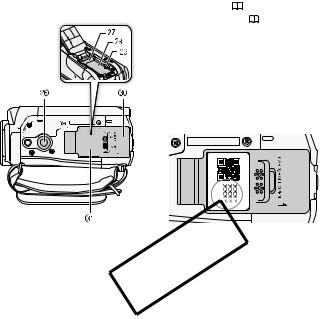
Bottom view |
hS Tripod socket ( 163) |
|
|
|
jS Memory card slot ( 36) |
|
kS Battery compartment |
|
lS Battery release latch |
|
qD Battery compartment cover/Memory |
|
card slot cover |
|
aD Serial number |
|
The serial number label is located on |
|
the battery compartment cover. |
Y
P
O
C
20 Introduction
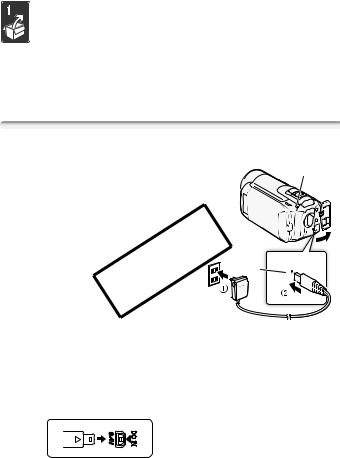
Preparations
This chapter describes basic operations, such as navigating the menus, and first time settings to help you learn more about your camcorder.
Getting Started
Charging the Battery Pack
The camcorder can be powered with a |
|
||
battery pack or directly using the com- |
|
||
pact power adapter. Charge the battery |
|
||
pack before use. |
|
|
|
For approximate charging times and |
|
||
recording/playback times with a fully |
|
||
|
|
Y |
|
charged battery pack, refer to the tables |
|
||
on pages 170-171. |
P |
DC IN |
|
|
|||
1 |
|
O |
|
Plug the compact power adapter |
terminal |
||
|
into a power outlet. |
|
|
2 |
Connect the compact power |
|
|
|
adapter to the camcorder’sCDC IN |
|
|
terminal.
• When connecting the compact power adapter’s cable to the camcorder (2), make sure to align the triangle marks on the cable’s connector and on the camcorder’s terminal (
 ).
).
ON/OFF (CHG) (charge) indicator
Preparations 21
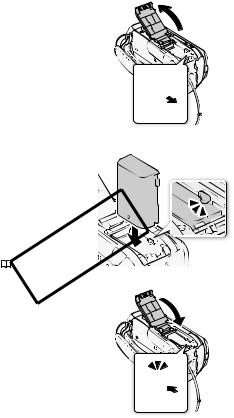
3Slide the battery compartment cover away from the lens and open it.
4 |
Remove the battery terminal cover |
3 |
|
||
|
from the battery pack. |
|
5 |
Insert the battery pack all the way |
|
|
into the compartment and press |
|
|
gently until it clicks. |
|
6 |
Close the cover and slide it toward |
|
|
the lens until you hear a click. |
|
7 Charging will start when the camcorder is turned off.
• If the camcorder was on, the green |
|
5 |
|
ON/OFF (CHG) indicator will go out |
|
|
|
when you turn off the camcorder. |
|
|
|
After a moment, the ON/OFF (CHG) |
|
|
|
indicator will start flashing in red |
|
|
|
(battery pack charging). The red ON/ |
Y |
|
|
OFF (CHG) indicator will go out when |
|
||
|
P |
|
|
the battery pack is fully charged. |
|
|
|
O |
|
|
|
• If the indicator flashes quickly, refer to |
|
|
|
Troubleshooting ( 147). |
|
|
|
C |
|
6 |
|
22 Preparations
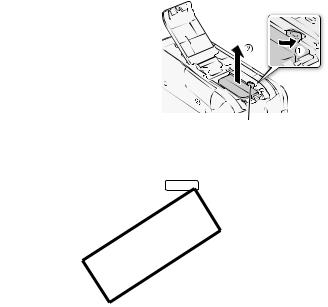
To remove the battery pack
1 Slide the battery compartment cover away from the lens and open it.
2 Press the battery release latch and pull out the battery pack.
3 Close the cover and slide it toward the lens until you hear a click.
Battery release latch
 IMPORTANT
IMPORTANT
•Turn off the camcorder before connecting or disconnecting the compact power adapter. After pressing POWER to turn off the camcorder, important data is updated in the memory. Be sure to wait until the green ON/OFF (CHG) indicator goes out.
•The first time you use a battery packY, fully charge it and then use the camcorder until the battery pacPk is completely exhausted.
•Do not connect to the camcorder’s DC IN terminal or to the compact power adapter any electricalOequipment that is not expressly recommended for use withCthis camcorder.
•To prevent equipment breakdowns and excessive heating, do not connect the supplied compact power adapter to voltage converters for overseas travels or special power sources such as those on aircraft and ships, DC-AC inverters, etc.
 NOTES
NOTES
•The battery pack will be charged only when the camcorder is off.
•We recommend charging the battery pack in temperatures between 10 °C and 30 °C (50 °F and 86 °F). Outside the temperature range of 0 °C to 40 °C (32 °F to 104 °F), charging will not start.
•If remaining battery time is an issue, you can power the camcorder using the compact power adapter so the battery pack will not be consumed.
•Charged battery packs continue to discharge naturally. Therefore, charge them on the day of use, or the day before, to ensure a full charge.
Preparations 23
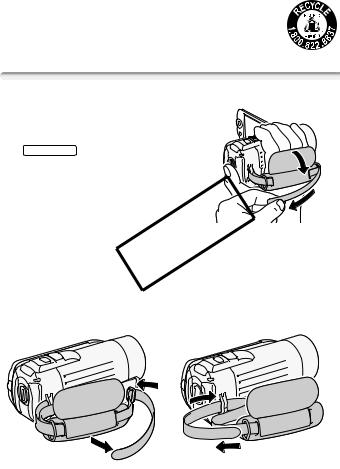
•We recommend that you prepare battery packs to last 2 to 3 times longer than you think you might need.
•USA and Canada only: The Lithium ion/polymer battery that
powers the product is recyclable. Please call 1-800-8-BATTERY for information on how to recycle this battery.
Preparing the Accessories
Fasten the grip belt.
Adjust the grip belt so that you can reach the zoom lever with your index finger, and the START/STOP button with your thumb.
|
Y |
|
P |
To remove the grip belt |
O |
C |
|
1 Lift the padded handgrip’s flap and detach the strap from the Velcro pad.
2 Pull the strap to remove it first from the front bracket on the camcorder, then to unthread it from the handgrip and finally to remove it from the rear bracket on the camcorder.
24 Preparations
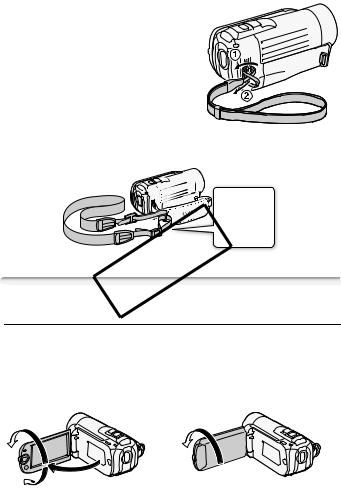
To attach an optional wrist strap
Pass the attaching end of the wrist strap through the rear bracket on the camcorder, thread the wrist strap through the loop and fasten.
You can also attach the wrist strap to the strap mount on the grip belt to use both for extra convenience and protection.
To attach an optional shoulder strap
Pass the ends of the shoulder strap through the strap mount on the grip belt and adjust the length of the strap.
Y |
P |
O |
Adjusting the Position and Brightness of the LCD Screen |
C |
Rotating the LCD Panel |
Open the LCD panel 90 degrees.
•You can rotate the panel 90 degrees downward.
•You can rotate the panel 180 degrees toward the lens. Rotating the LCD panel 180 degrees can be useful when you wish to include yourself in the picture when recording with the self timer.
180° |
180° |
90° |
Subject can monitor the LCD screen |
Preparations 25
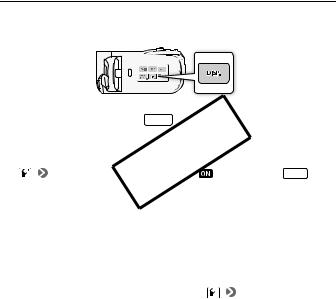
 NOTES
NOTES
•About the LCD screen: The screen is produced using extremely high-pre- cision manufacturing techniques, with more than 99.99% of the pixels operating to specification. Less than 0.01% of the pixels may occasionally misfire or appear as black, red, blue or green dots. This has no effect on the recorded image and does not constitute a malfunction.
LCD Backlight
When recording in bright places it may be difficult to use the LCD screen. Turn on the LCD backlight to make it brighter.
With the camcorder on, hold |
DISP. pressed down for more than |
||
2 seconds. |
|
|
|
• Repeat this action to switch the LCD bacYklight between off (normal) and |
|||
on (bright). |
P |
||
• If |
[LCD Screen Dimmer] is set to [ |
On], pressing DISP. for |
|
|
|
O |
|
more than 2 seconds willCturn off the screen dimmer and return the LCD screen to its previous brightness setting.
 NOTES
NOTES
•The LCD backlight does not affect the brightness of the recordings.
•Using the bright setting will shorten the effective usage time of the battery pack.
•You can further adjust the brightness of the LCD screen with the 

[LCD Brightness] setting, or dim it with the  [LCD Screen Dimmer] setting to use in places where the light from the LCD screen can be a nuisance.
[LCD Screen Dimmer] setting to use in places where the light from the LCD screen can be a nuisance.
26 Preparations
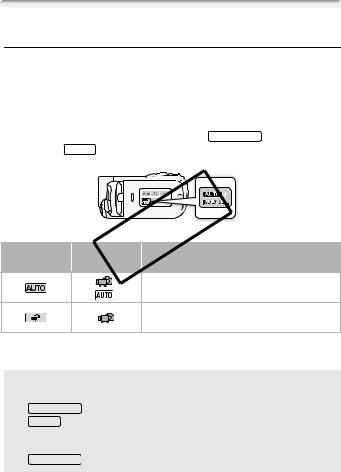
Basic Operation of the Camcorder
Operating Modes
Recording
The camcorder offers two basic modes for recording video and photos: Smart AUTO ( ) mode for beginners or if you just prefer not to bother with detailed camcorder settings, and flexible recording (
) mode for beginners or if you just prefer not to bother with detailed camcorder settings, and flexible recording ( ) mode, which lets you change the camcorder’s settings to your preference. Press the
) mode, which lets you change the camcorder’s settings to your preference. Press the  button to switch the camcorder to
button to switch the camcorder to  mode and press the button again to switch back to
mode and press the button again to switch back to  mode. In either mode, you can record movies by pressing START/STOP or take photos by pressing PHOTO .
mode. In either mode, you can record movies by pressing START/STOP or take photos by pressing PHOTO .
|
|
|
|
Y |
|
|
|
P |
|
|
|
O |
|
|
Operating |
C |
|
|
|
Onscreen |
|
|
Operation |
|
mode |
icon |
|
|
|
|
|
|
||
|
* |
Easy recording of movies and photos. |
||
|
|
|
|
|
|
|
Recording of movies and photos while enjoying full |
||
|
|
access to the menus and advanced functions. |
||
*The mode icon displayed will change according to the optimal mode selected by the Smart AUTO function.
About the Smart AUTO mode
•Only the following buttons/functions are available in this mode.
-START/STOP for recording movies
-PHOTO for recording photos
-Zoom lever
-Quick Start ( 43)
43)
-VIDEO SNAP for video snapshot ( 58)
58)
Preparations 27
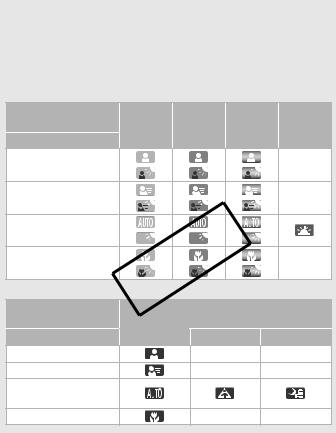
•When shooting in  mode, the camcorder will automatically detect certain characteristics of the subject, background, lighting conditions, etc. It will then adjust various settings (focus, exposure, color, image stabilization, image quality, among others), selecting the best settings for the scene you want to shoot. The Smart AUTO mode icon will change to one of the following icons.
mode, the camcorder will automatically detect certain characteristics of the subject, background, lighting conditions, etc. It will then adjust various settings (focus, exposure, color, image stabilization, image quality, among others), selecting the best settings for the scene you want to shoot. The Smart AUTO mode icon will change to one of the following icons.
Smart AUTO icons
Background → |
|
Bright |
Blue skies |
Vivid colors |
Sunsets |
||
(color of the icon) |
|
||||||
|
(grey) |
(light blue) |
(green/red) |
(orange) |
|||
Subject ↓ |
|
||||||
|
|
|
|
|
|
|
|
People (stationary) |
|
|
|
|
|
|
– |
|
( |
) |
( |
) |
( |
) |
|
|
|
||||||
People (moving) |
|
|
|
|
|
|
– |
|
( |
) |
( |
) |
( |
) |
|
|
|
||||||
Subjects other than people, |
|
|
|
|
|
|
|
such as landscapes |
( |
) |
( |
) |
( |
) |
|
|
|
||||||
Close objects |
|
|
|
Y |
|
|
|
|
|
P |
|
|
– |
||
|
( |
) |
( |
) |
|||
|
|
||||||
|
( |
) |
|
||||
|
|
O |
|
|
|
|
|
The icon in parentheses appears under backlight conditions. |
|
|
|||||
Background → |
C |
|
Dark (dark blue) |
|
|
||
|
|
|
|
|
|||
(color of the icon) |
|
|
|
|
|
||
|
|
|
|
|
|
|
|
Subject ↓ |
|
|
|
Spotlight |
|
Night scene |
|
People (stationary) |
|
|
|
– |
|
|
– |
People (moving) |
|
|
|
– |
|
|
– |
Subjects other than people, such as landscapes
Close objects |
|
– |
– |
28 Preparations
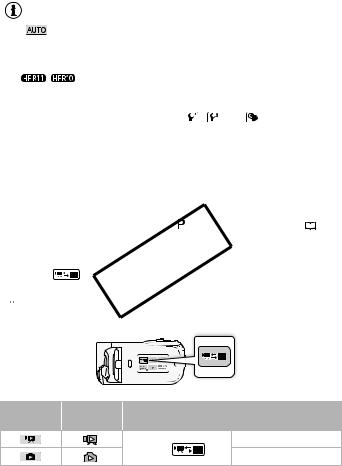
|
NOTES |
|
|
|
|
• In |
|
mode, menus cannot be accessed but the following settings |
|||
can be changed in advance. |
|
|
|
||
- Recording mode of movies |
|
|
|
||
- Size/quality of photos |
|
|
|
||
- |
/ |
Your selection of recording media for movies/photos |
|||
- Video snapshot length |
|
|
|
||
- Auto slow shutter |
|
|
|
||
- All settings under the setup menu’s |
, |
and |
tabs. |
||
• Even in flexible recording mode, the camcorder can help you with the settings. For example, you can use the Special Scene recording programs ( 55) to set at once all the optimal settings to match special recording conditions.
55) to set at once all the optimal settings to match special recording conditions.
• Under certain conditions, the Smart AUTO icon that appears on the screen may not match the actual scene. Especially when shooting against orange or blue backgrounds, the Sunset or one of the Blue skies icons may appear and the colors may not look natural. In such
case, we recommend recording in [ Programmed AE] mode ( |
|
55). |
|
|
|||
|
Y |
|
|
Playback |
P |
||
Press the |
O |
||
(camera/play) button to switch the camcorder |
|||
|
C |
||
between camera (recording) mode and playback mode. You can press  when the camcorder is off to turn it on directly in playback
when the camcorder is off to turn it on directly in playback
mode.
Operating |
Onscreen |
Operation |
|
mode |
icon |
||
|
|||
|
|
Playing back movies. |
|
|
|
Press |
|
|
|
Viewing photos. |
|
|
|
Preparations 29 |
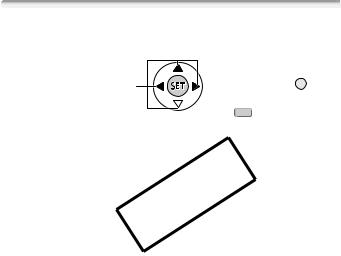
 NOTES
NOTES
• /
/ When switching to a playback mode, the memory selected for playback will be the same currently used for recording.
When switching to a playback mode, the memory selected for playback will be the same currently used for recording.
Joystick and Joystick Guide
Use the joystick to operate the camcorder’s menus.
Push the joystick up, down, left or right ( ,
,  ) to select an item or change settings.
) to select an item or change settings.
Press the joystick itself ( 
 ) to save
) to save  the settings or confirm an action. On
the settings or confirm an action. On  menu screens, this is indicated by the
menu screens, this is indicated by the
icon  .
.
If the joystick guide does not appear on the screen, press  or push the joystick (
or push the joystick ( ,
,  ) to display it. The functions that appear depend
) to display it. The functions that appear depend
• or
or  mode: Select (
mode: Select ( ) a functionYand press
) a functionYand press  to change the setting. With some functions, youPwill need to make further adjustments (
to change the setting. With some functions, youPwill need to make further adjustments ( ). O
). O
 mode: First, select (
mode: First, select ( ) a “row” of functions; then, press
) a “row” of functions; then, press  operate the function inCthe middle or push the joystick (
operate the function inCthe middle or push the joystick ( or
or  operate the function on the left or right, respectively.• to) toon the operating mode.
operate the function on the left or right, respectively.• to) toon the operating mode.
The joystick guide will minimize after 2 seconds. When the joystick guide is minimized, you can still adjust or turn on/off the selected function; you can also maximize ( ) the joystick guide to select another function or hide (
) the joystick guide to select another function or hide ( ) it altogether.
) it altogether.
30 Preparations
